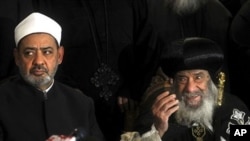The head of Egypt's Coptic Christian community, Pope Shenouda III, is calling for calm after another night of sporadic demonstrations and clashes with police. The violence follows a church bombing that killed 23 people Saturday in Alexandria.
Following sporadic overnight clashes and demonstrations in the Egyptian capital, Cairo, many politicians and religious leaders have been calling for calm.
On again, off again clashes between angry Coptic Christians and Egyptian security forces have increased tensions in parts of the city.
Pope Shenouda III, who leads Egypt's estimated 10 million Coptic Christians, is urging his followers to stay calm. He is denouncing what he calls "rabble rousers".
He says that all problems can be solved through peaceful means, rather than by belligerence and tumult. He adds that people other than Copts have infiltrated demonstrations about the church bombing, even though they have nothing to do with the matter. He complains that these people have gone beyond what is polite and acceptable and used violence, which is not a trait of Copts.
Pope Shenouda blames the disturbances on socio-economic conditions that have made many Egyptians desperate.
He says that people can be manipulated or pushed to behave rashly through poverty or hunger. He argues that such ongoing problems must be solved calmly and with all available means.
The Coptic pope alluded to some of the grievances of his community against the government, complaining that it has not treated Copts fairly.
He says he believes in a society of law, and a society without law will be in turmoil. He says the law must be fair and treat everyone equally, and added any law that harms part of the population must be corrected.
Copts have repeatedly complained about discrimination against them in employment, building of churches, and in laws concerning individuals who have converted to Christianity. Coptic attorney Naguib Gobrail mentions several of those demands.
He says Copts are asking President Hosni Mubarak to increase security and reach agreements over building and repairing churches, including adopting a single law applicable to both churches and mosques.
Veteran Egyptian publisher and editor Hisham Kassem says the situation is worrisome.
"I have never seen anything of this magnitude before," said Kassem. "But, again, a terrorist attack is a terrorist attack. We still do not know who did it, and terrorist attacks cannot permanently be prevented. There definitely is failure on the part of the Ministry of the Interior, but that is another story."
Kassem adds discriminatory practices against Copts are making the situation explosive.
He notes that few Copts are given prominent positions in the government and says anyone can build a mosque in a public park, overnight, but it can take years to get a permit just to repair a church.
The Egyptian government has deployed security forces around most churches in major towns and cities and cancelled leave for top officers as the country prepares for Coptic Christmas on January 7. Security has also been tightened at airports and ports to monitor the arrival or departure of suspected terrorists.














